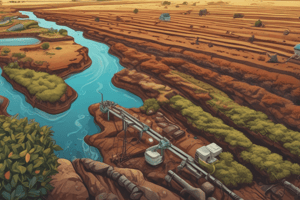Podcast
Questions and Answers
Early agricultural civilizations had a sophisticated understanding of soil composition, including its chemical properties.
Early agricultural civilizations had a sophisticated understanding of soil composition, including its chemical properties.
False (B)
The development of irrigation systems occurred during the Classical Period.
The development of irrigation systems occurred during the Classical Period.
False (B)
Theophrastus is often recognized as a significant contributor to the field of botany during ancient times.
Theophrastus is often recognized as a significant contributor to the field of botany during ancient times.
True (A)
Mesopotamia was one of the examples of early agricultural civilizations noted for advanced land management practices.
Mesopotamia was one of the examples of early agricultural civilizations noted for advanced land management practices.
The characteristics of soil were first observed by ancient Romans in the classical era.
The characteristics of soil were first observed by ancient Romans in the classical era.
What was a primary focus of early agricultural civilizations in relation to soil?
What was a primary focus of early agricultural civilizations in relation to soil?
What significant development is associated with early agricultural civilizations?
What significant development is associated with early agricultural civilizations?
Which historical figure is noted for early observations on the variations in soil and their effects on plants?
Which historical figure is noted for early observations on the variations in soil and their effects on plants?
In which regions did early agricultural civilizations, known for land management practices, primarily develop?
In which regions did early agricultural civilizations, known for land management practices, primarily develop?
What aspect of soil was NOT primarily considered by early agricultural civilizations?
What aspect of soil was NOT primarily considered by early agricultural civilizations?
Study Notes
Early Agricultural Civilizations
- Societies developed a basic understanding of soil, focusing on characteristics like texture, color, and productivity.
- Innovation of irrigation systems facilitated water management for agriculture.
- Implementation of land management practices enhanced crop yields and soil fertility.
- Notable regions exemplifying early agriculture include the Nile Valley, Mesopotamia, and the Indus Valley.
Classical Period
- Theophrastus, a Greek philosopher and botanist (372-287 BC), is recognized as the "father of botany."
- He conducted early studies on soil variation and its effects on plant growth, laying foundational concepts for future agricultural science.
Early Agricultural Civilizations
- Societies developed a basic understanding of soil, focusing on characteristics like texture, color, and productivity.
- Innovation of irrigation systems facilitated water management for agriculture.
- Implementation of land management practices enhanced crop yields and soil fertility.
- Notable regions exemplifying early agriculture include the Nile Valley, Mesopotamia, and the Indus Valley.
Classical Period
- Theophrastus, a Greek philosopher and botanist (372-287 BC), is recognized as the "father of botany."
- He conducted early studies on soil variation and its effects on plant growth, laying foundational concepts for future agricultural science.
Studying That Suits You
Use AI to generate personalized quizzes and flashcards to suit your learning preferences.
Description
Test your knowledge on the early agricultural civilizations and their understanding of soil. Explore key developments in irrigation and land management practices, as well as significant contributions from philosophers like Theophrastus. Learn about the Nile Valley, Mesopotamia, and the Indus Valley.




